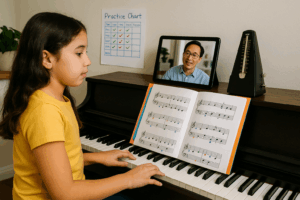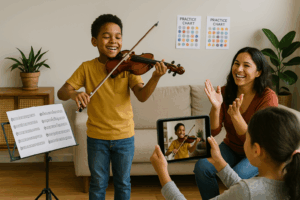On a typical piano there will be three pedals in the center by the floor. These pedals are used to change the sound and effects of the piano. The most common pedal is the Damper pedal located to the right. When the damper pedal is pressed down it raises the dampers inside the piano off
Lessons In Your Home Blog
4 ways to know if a note is wrong! Use your ears in Music Lessons
There are many things to concentrate and focus on while learning to play new pieces of music, reading notes, counting rhythms, moving hand positions, using pedals, etc. One thing that I try to have my students not forget is to use their ears and to listen to what they are playing. Sometimes while a student
Keep In Home Music Students Longer – The Best Part of Teaching Lessons!
The best part of teaching in home music lessons is your students stay with you longer then those who travel to their lessons at a music school or a teacher’s home. There are 3 easy to understand reasons why this is. One, a great music teacher gets more time with the family of their student.
Why Use a Metronome at Home? Busting the Myths and Building Great Habits
When we recommend metronomes to new students, we often hear hesitation. “Isn’t that just for professionals?” “Won’t it make practice boring?” “My child already has a good sense of rhythm.” We get it—metronomes have a reputation. But as private music teachers who work with beginner students every day, we can say with confidence: using a

10 Fun Ways to Motivate Young Music Students
Even the most enthusiastic beginner can sometimes hit a wall when it comes to practicing. As music teachers who work with young learners, we know it’s normal for motivation to dip now and then. The key? Keep things fresh, fun, and focused. If you’re looking for simple, effective ways to motivate young music students, these

Using A Visual Aide to Make Practice More Effective
I am a firm believer in having clear goals when it comes to music practice. Students must ALWAYS know what it is they are trying to achieve in any given practice session. Necessarily, they must first know what it is they need to work on. That is where the teacher provides the input about what
Academic Benefits of Music Lessons from a D.C./Baltimore Music Teacher
Many times, I am asked by parents about the academic benefits of having their children take music lessons. We hear all the time that learning music improves math scores and assists in other areas of academic performance, but why? My take on it is that music lessons and learning to read music are ‘brain exercises’
Drum Sets- Electronic Vs. Acoustic? Learning to Play Drums
As an experienced drum set teacher in Miami, FL, many parents ask me whether they should purchase a standard acoustic drum set or the increasingly popular electronic drum set for their young drum student. Either is fine, but there are definitely pros and cons with both. An electronic set may seem more practical on the
Beyond the Gold Star: How Stickers and Goal Setting Help Music Students Grow
When I started teaching, I underestimated the power of a shiny sticker. Now? I keep an entire drawer stocked. Why? Because structured rewards like stickers—paired with thoughtful goal setting in music lessons—consistently produce big results, especially for younger students. This post isn’t a lecture—it’s a real look at what’s working in our studios, week after

A D.C. & Baltimore Piano Teacher’s Favorite Methods: Age 7 to 12 Years Old
On average, most students Lessons In Your Home works with on piano fall into the 7 to 12 year old age range. We definitely have a lot of students who are younger and older, but as a general age group, this is the most popular. It seems also that authors of the standard, popular piano